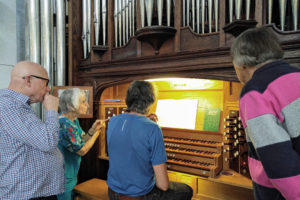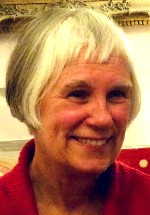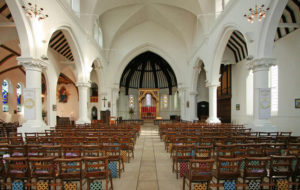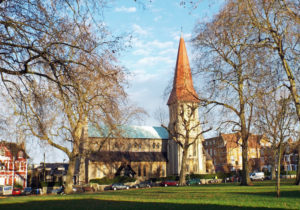Keyboard skills workshop at St John’s, Goose Green — Saturday 8 June 3.30-5.30pm
A noble group of four came over to St John’s, Goose Green, East Dulwich, on a changeable Saturday afternoon, to work on keyboard skills; skills that might sound like “tests” but are integral to all we do, particularly in the church setting.
So, why are we put off when we hear the words “sight-reading”, “transposition” and “score-reading”? Perhaps because we normally only hear those words in relation to an exam — ABRSM, RCO or similar. They instil nerves and panic. What we might not realise is that these skills are fundamental to our work in supporting worship.
So how do we acquire these skills and make them part of our everyday playing life? Well, by attending Marilyn’s excellent workshop for the SSLSO, of course. On this Saturday afternoon, we looked at sight-reading and transposition.
First things first. Learn and practise scales.
When you open up a piece to practise, look at the key signature, play this scale and arpeggio. Does the music modulate? Identify those keys and again, play those scales and arpeggios. This will help your fingers to operate properly, and for you to establish which fingers you use for which notes in which key.
Place your hands over the manuals, where they will start, then practise moves between manuals. Control the big limbs, Marilyn says. Control of the big limbs will lead to the direction of the smaller bits of limbs, such as hands and fingers. (A child won’t manage fine motor skills until after their gross motor skills are developed.)
Use your ears, not just your eyes. Connect what you hear to your fingers and feet.
Need to transpose a hymn, because it’s a bit too high for the congregation, or the organ’s out of tune or there’s a note not sounding? Play it in the written key. Hear it in this key, then sing it, hear it in the new key, sing each part. Establish what the new key is, the key signature, and any accidentals. Play the scale and arpeggio. Then, take it phrase by phrase.
What about sight-reading? Look at the score, without touching the keyboard. Establish everything you can about the piece, every element that is involved. Everything: what it’s scored for (manuals / pedals?); the key signature and related keys the piece moves through; the time signature, the tempo, the rhythm; dynamics, any use of the swell box; manual changes; intervals and fingering. And, of course, watch the music from one line to the next, there’s often a trap.
You could do all of this any time you open up any repertoire to play.
 So, next time you are thrown an unfamiliar piece with only a few minutes’ notice, read through it, noting as much about the music as you can, look at where your hands and feet are going, and when you play, keep the pulse steady throughout.
So, next time you are thrown an unfamiliar piece with only a few minutes’ notice, read through it, noting as much about the music as you can, look at where your hands and feet are going, and when you play, keep the pulse steady throughout.
Then, if you haven’t already done so, enquire about, book yourself on the next keyboard-skills and technique workshop with Marilyn — we do hope to run more of these.
Now, back to those scales.
The SSLSO thanks Marilyn Harper; St John’s, Goose Green; and John Webber, our host, for this most valuable afternoon.




